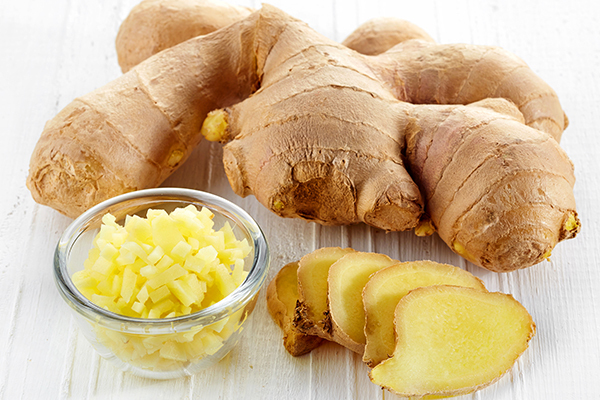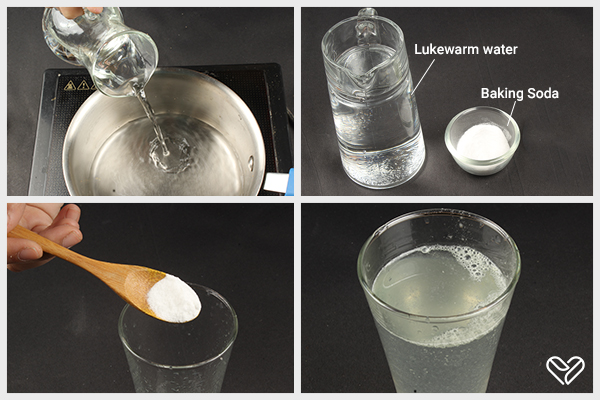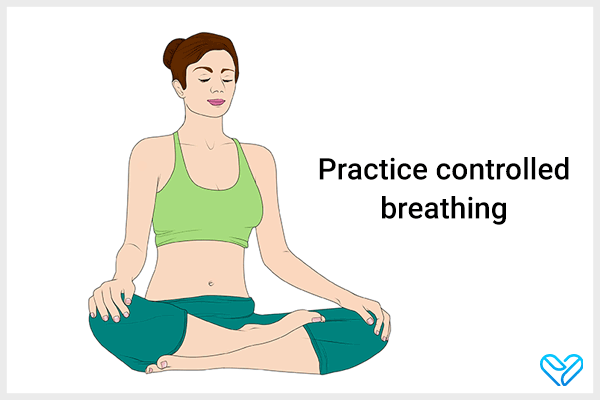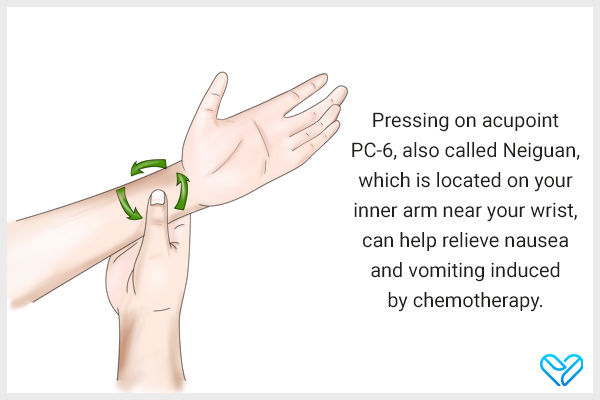In this article:
Nausea is the unpleasant feeling you get before you throw up. Your entire digestive system feels upset, with repeated reflux and gagging.

It’s your body’s signal to expel unwanted stomach contents, and vomiting is when you actually succeed in doing so. Nausea is pretty common and harmless but can prove extremely discomforting while it lasts.
It can be hard to concentrate on your work or enjoy everyday life when you are feeling nauseous, but it’s nothing a bit of self-care can’t solve. That said, persistent nausea can be a sign of some underlying illness that may require your doctor’s attention.
Home Remedies to Relieve Nausea
The following home remedies may help relieve nausea without causing any adverse side effects.
1. Consume ginger

The bioactive components present in the ginger root called gingerols and shogaols are believed to exhibit antiemetic properties that can help relieve nausea brought on by pregnancy or otherwise, without causing any adverse side effects. (1)(2)(3)(4)
Ginger may also help reduce post-operative and chemotherapy-induced nausea. (5)(6)(7)
More research is required with a larger sample size to help determine the positive effects of ginger on chemotherapy-induced nausea.
You can add ginger to your beverages, soups, and dishes to get relief from nausea.
Note: Avoid using ginger remedies if you are taking a prescribed anticoagulant, aspirin, or a similar medication.
Multiple studies have backed the use of ginger in treating nausea and vomiting. However, additional scientific research is required to ascertain a set dosage of ginger as a remedy to relieve nausea.
2. Try peppermint aromatherapy
Peppermint may help deal with nausea by relaxing the lining of the stomach. Peppermint’s antispasmodic properties may also help prevent stomach cramps.
Some studies found peppermint aromatherapy to be useful in reducing pregnancy-related, post-operative, or chemotherapy-induced nausea, (8)(9)(10) while others did not record any significant results. (11)
Given the mixed results, further studies are needed to know just how effective this remedy actually is.
How to use:
- To relieve nausea, you can smear a cotton handkerchief with peppermint oil and inhale through the cloth.
- You can add a few drops of peppermint oil in a diffuser and breathe in the soothing vapors.
3. Maintain adequate levels of vitamin B6

Vitamin B6 has been found to reduce the symptoms of nausea and vomiting significantly.
A 2019 study supported the use of vitamin B6 over ginger to alleviate the symptoms of nausea in pregnant women over a period of 60 days. (12)
Another study found that both dimenhydrinate and vitamin B6 was found to significantly reduce nausea associated with pregnancy. (13)
How to use:
Add foods that are rich in vitamin B6 to your regular diet. Some of the best dietary sources of this vital nutrient include fish, chicken, turkey, eggs, soya beans, wholegrain cereals (wheat germ, oatmeal, and brown rice), and various vegetables.
Note: Consult your doctor before taking any supplements.
Studies have validated the use of vitamin B6 as an antiemetic. When compared with ginger, vitamin B6 was shown to be a more effective treatment method.
4. Inhale rubbing alcohol
Rubbing alcohol, chemically known as 70% isopropyl alcohol, is a highly volatile organic solvent commonly used in households.
How to use:
- Two studies reported that individuals who inhaled alcohol pads experienced a reduction in nausea sooner than the control group. (14)(15)
- Another 2018 study supported the use of rubbing alcohol aromatherapy to significantly reduce the symptoms of mild to moderate nausea and vomiting. (16)
The strong smell of rubbing alcohol can help cool down your internal system and mitigate the feeling of nausea.
5. Use lemon

A lemon essential oil may help reduce the symptoms of nausea as reported by the results of a randomized control trial where 40% of the pregnant subjects registered relief from nausea without any reported side effects after using lemon essential oil aromatherapy.
However, more direct studies are needed to conclusively establish the efficacy, safety, and mechanism of lemon essential oil for easing nausea. (17)(18)(19)
How to use:
- Consume lemon in a variety of ways, such as lemon water, lemon, and honey mixed in water, lemon and ginger tea, or a simple lemonade.
- Do aromatherapy with lemon essential oil.
6. Drink baking soda and water solution

Baking soda diluted with water may work as an antacid and may relieve nausea.
Although there is little to no scientific support for this claim, a lot of general users have reported good results after using this remedy, making it worth a try but only after running it by your doctor.
How to use:
Mix 1 teaspoon of baking soda in 8 ounces or 1 cup of lukewarm water until it dissolves completely, and drink this solution when you feel nauseous.
Caution: Prolonged or excessive intake of baking soda can be harmful and even toxic. Thus, exercise necessary precautions and stick to the prescribed dosage. For some people, this remedy may exacerbate their condition by causing even more vomiting than before, in addition to bloating, diarrhea, stomach pain, and other digestive discomforts.
7. Try chamomile tea

Chamomile can help calm your digestive system by relieving excess acidity. (20)(21)(22) This soothing herb can also reduce your stress levels, which is a major contributor to heartburn, nausea, and an upset stomach in general.
The best way to consume this medicinal herb is in the form of a tea. You can buy instant chamomile tea from the market or prepare it fresh at home with chamomile petals.
How to make chamomile tea:
- In a pan, bring 500 ml or 2 cups of water to a boil and then turn off the heat.
- Add 2–3 tablespoons of dried chamomile petals in the water and cover the pan with a lid.
- After 3–5 minutes, strain the tea into cups and add a sprig of mint, honey, or lemon for extra flavor.
Caution:
- Try a small amount of chamomile tea at first to make sure you are not allergic to it. If you experience any adverse reaction after drinking it, discontinue its use at once.
- Chamomile tea is not recommended for children as well as pregnant or lactating women.
8. Eat pickles
It is common for women to crave the tangy goodness of pickles during their pregnancy, mostly because they are running low on sodium.
Pickles are soaked in a solution of vinegar and salt, which can compensate for any such sodium deficiency and may even curb pregnancy-induced nausea in the process.
Note:
- This low-calorie treat costs next to nothing but make sure to buy unsweetened varieties to avoid undue weight gain.
- Look for brands that do not use excess preservatives, which can harm your pregnancy.
- You can make pickles yourself, but avoid homemade mango pickle, which often contains traces of listeria bacteria that can be potentially dangerous to your vulnerable state.
Alternative Techniques
You can try these unconventional but fairly helpful therapies to reduce the frequency and intensity of your nausea episodes.
1. Practice controlled breathing

Controlled breathing may help reduce the associated discomfort of nausea to some extent.
The findings of a 2014 study showed that practicing diaphragmatic breathing helped slow down the respiration rate and improve the associated nausea, fatigue, and vomiting that accompany motion sickness. (23)
Another 2015 study suggested that combining controlled breathing with aromatherapy is effective in alleviating the symptoms of nausea and the associated discomfort. (24)
2. Try acupressure and acupuncture

Acupressure and acupuncture therapies may help reduce nausea and its related symptoms through the application of pressure at specific points on the body called acupoints.
In acupuncture, the pressure is applied using a special acupuncture needle, whereas, in acupressure, manual pressure is applied to the pressure point.
Pressing on acupoint PC-6, also called Neiguan, which is located on your inner arm near your wrist, can help relieve nausea and vomiting induced by chemotherapy. Special wrist bands are available over the counter for this purpose.
A systematic review suggested that the application of acupuncture on PC-6 acupoint considerably resulted in better outcomes by reducing the incidence of nausea and vomiting. (25)
Acupressure has been found to be useful in treating post-operative nausea as well. (26)
A 2017 systematic review supported the application of acupressure to reduce the severity of nausea engendered by chemotherapy, with no significant effects on the occurrence of vomiting. (27)
Acupuncture therapy can also benefit individuals experiencing chemotherapy-induced nausea. Another 2013 systematic review suggested that acupuncture may be considered as adjunctive therapy to reduce nausea as a result of chemotherapy. (28)
Additional research involving several acupuncturists is required to confirm the statistical significance and ascertain the biological mechanism of acupuncture for nausea relief. (28)
Although multiple studies have reported the beneficial effects of acupressure and acupuncture therapies on nausea, further research is needed to establish the efficacy of these methods.
Self-Care Practices
Here are a few tips that may help ease nausea:
- Get enough rest.
- Wear loose clothes.
- Sit in an upright position after having a meal. Avoid lying on a prostrate position within 30–60 minutes after eating.
- Do not sit in stuffy areas. Make sure to sit in places with plenty of air circulation.
- The best dietary approach is following the BRAT diet, which includes bland foods such as bananas, rice, applesauce with no added sugar, toast, plain pasta, bland potatoes, dry crackers, unbuttered bread, and chicken soup.
- When you are grappling with nausea, sour or tangy foods may be easier to the stomach (unless you have sores in your mouth).
- Avoid extremely sweet foods and instead choose salty foods. Also, keep away from spicy foods, dairy products, and foods loaded with fats.
- Clear, cool beverages are recommended. Take whatever you feel you can tolerate. Examples include clear soups, carbonated beverages, and ice cubes made of frozen drinks. (Note: When drinking with a straw, sip slowly to avoid swallowing air that can cause gas).
- Drink beverages that settle the stomach, such as ginger ale or chamomile tea.
- Keep yourself distracted with music, TV, or other sources of recreation during a bout of nausea.
- Sometimes, the smell of certain foods, especially fatty foods, can trigger nausea. If such is the case, bland foods may come to your rescue. Some perfumes may also trigger your nausea – avoid them.
- Small portions of foods that are low in fat seem to work best. These foods are easy to digest and move through the stomach fast. If you are eating small portions of low-fat foods, be sure to eat more often to meet your calorie and protein needs.
- Refrain from eating heavy meals before or during travel.
- If your nausea seems to cause vomiting, take your prescribed medications, and relax while it works.
- If chemotherapy or any medication is the reason behind your nausea, it is advised that you consult your doctor to look for better alternatives. Also, if you are undergoing chemotherapy, avoid drinking caffeinated drinks.
Tips to Prevent Nausea

You may avoid getting a bout of nausea by following certain preventive measures:
- Wash your hands regularly to avoid contracting an infection that can cause nausea. Avoid sharing clothing and utensils with an infected individual.
- Keep your house clean through regular disinfection.
- If overeating is the cause of nausea, eat small frequent meals to allow the stomach to digest foods gradually.
- Avoid eating out at places where there is a chance presence of stale or spoiled food.
- Do not eat foods that make you feel nauseated.
Nausea may get triggered at specific times of the day. Avoid eating the foods that you really like when you feel nauseated to prevent relating your favorite foods with nausea and vomiting.
Final Word
Nausea can be triggered by a wide range of factors, from overeating, indigestion, severe pain, head trauma, stress or anxiety, to more serious conditions that will require more intensive medical treatment.
You can try the above-listed remedies, therapies, and tips to relieve occasional nausea, but if your condition becomes unusually frequent, severe or long-lasting, get medical help.
The doctor will conduct the necessary tests to determine the root cause of the problem and treat it accordingly.

- Was this article helpful?
- YES, THANKS!NOT REALLY


